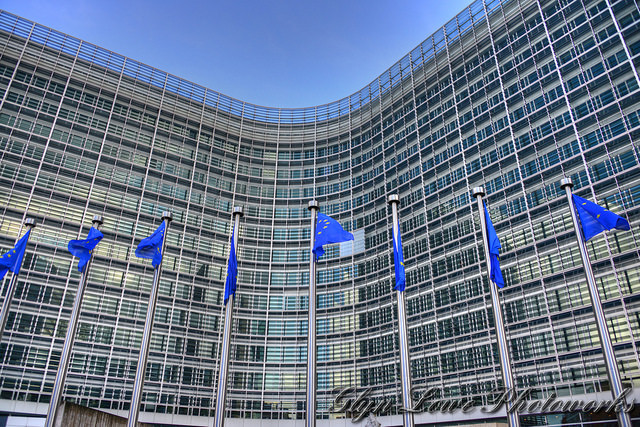That was part of six position papers on the negotiations of Brexit, that the commision published on Wednesday 28 June.
Furthermore, after the UK has left the EU, animal-derived food should be subject to import rules, the commission argued.
This is likely to be met with opposition from the British government, which wants to end European Court of Justice jurisdiction in the UK.
The paper also dealt with governance issues, ongoing police and judicial cooperation in criminal matters, on issues relating to the functioning of the union’s institutions, agencies and bodies, on goods placed on the market under union law before the withdrawal date, on ongoing union judicial and administrative procedures, and on judicial cooperation in civil and commercial matters.
On governance and ECJ
The withdrawal agreement should include appropriate dispute settlement mechanisms for the application and interpretation of the agreement, the commission stated:
“All rulings given by the court of justice pursuant to the provisions of the withdrawal agreement are binding on the union and the United Kingdom, and are enforceable in the United Kingdom under the same conditions as those laid down in article 299 TFEU.”
Furthermore, the paper proposes to create a joint committee in which the UK and the EU are both represented. This committee would be tasked with ensuring the good functioning of the agreement, adopting all measures necessary to deal with unforeseen situations, deciding on incorporating any future amendments to union law in the withdrawal agreement, discussing any divergent views and performing any other tasks conferred on it by the withdrawal agreement. If the joint committee was unable to come to an agreement, the matter can be referred to the ECJ.
Enforcement and dispute settlement
The EU commission proposed to establish one regime for enforcing the provisions on citizens’ rights and for enshrining the continued application of union law and another regime for any other provisions.
On citizens’ rights, the paper said that the European Commission should have full powers for the monitoring of the implementation of the provisions on citizens’ rights, and that the ECJ should have jurisdiction on the duration of the protection of citizens’ rights in the withdrawal agreement.
To ensure compliance with ECJ judgements, the complaining party may ask the court for a lump sum or a penalty payment or the suspension of certain parts of the withdrawal agreement.
Ongoing EU judicial and administrative procedures
The commission paper stated that the withdrawal agreement should agree on proceedings before the ECJ involving the UK and/or UK residents or legal persons. Judgements of the ECJ given before the withdrawal date as well as judgements on cases which were started before that date would have binding force in the UK after the withdrawal date and would be enforceable there under the same conditions as laid out in article 299 TFEU, the relevant part of the European treaties.
Judicial cooperation in commercial and civil matters
The paper stated that “relevant provisions” of EU law should continue to apply to any contract, claim or “judicial cooperation procedure” entered into before or in process at the UK’s withdrawal date. The EU institutions, bodies and agencies would still be able to conduct administrative procedures pending on the withdrawal date concerning compliance by the UK and/or residents and legal persons with union law. The position paper stated that “such procedures include, for example, state aid investigations by the commission concerning the United Kingdom, or procedures initiated by the European Supervisory Authorities.”
Ongoing police and judicial cooperation in criminal matters
The paper proposed that the ECJ have jurisdiction over ongoing police and judicial matters, such as the European Arrest Warrant, the mutual recognition of financial penalties, the European protection order, the request for information or data held by law enforcement authorities, and passenger name records. Current protection of classified information would continue to apply.
Goods placed on the market under EU law
The European Commission stated that:
“A good lawfully placed on the market before the withdrawal date and still in the distribution chain in the United Kingdom or in the single market after the withdrawal date can in principle continue to be made available if it complies with Union product rules applicable on the withdrawal date.”
However, this principle only addresses product rules, not modalities of sale. This means that rules of custom procedures, tariffs and taxes, as well as intellectual property rights are still subject to change.
This principle would also be without prejudice to either party taking non-discriminatory measures to prohibit or restrict the making available of a good on their market on serious grounds of health or safety of persons or other serious aspects of public interest protection.
The withdrawal agreement should also provide for continued oversight of these goods.
Any live animals and certain germinal products, whose movement has been initiated before the date of the withdrawal agreement, could enter the UK and the single market on the basis of the rules governing intra-EU movements.
All animal-derived food and animal-derived feed, as well as animal by-products entering the single market after the withdrawal date should be subject to applicable rules of importation.
Because the UK will not be bound by the EU acquis on market surveillance, the commission proposes to establish mechanisms for the mutual exchange of relevant information and for cooperation on market surveillance as regards non-compliant goods placed on the single market.
The sixth paper laid out the position on the functioning of EU institutions, bodies, agencies and bodies, and mainly dealith with professional secrecy, privileges and immunities of agencies based in the UK, and the management of access to document requests and EU classified information.
The next dates for negotiation rounds, which happen once every 4 weeks, are: 17 July, 28 August, 18 September, 9 October. The negotiating rounds consist of plenary sessions and negotiating group meetings. Three negotiating groups have been set up so far: one on citizens' rights, one on financial settlement and one other separation issues.
